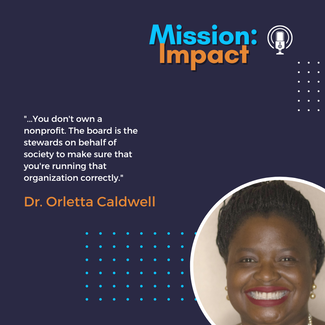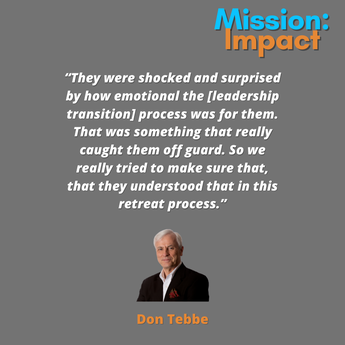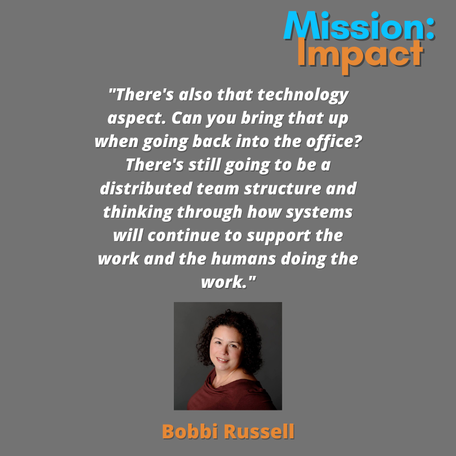Mission: Impact podcast & blog
Build a better world without becoming a martyr to your nonprofit cause
Listen on:
 In episode 71 of Mission: Impact, Carol and her guest, Dr. Orletta Caldwell discuss:
Guest Bio: Dr. Caldwell is a passionate and qualified educator and nonprofit management specialist. Caldwell brings more than 30 years of administrative and leadership experience to the CEO of Beyond Existing Enterprises. Highlights of a stellar and diverse career include Executive Director, Camp Baber, and Assistant Professor at Grand Rapids Community College. She has served in many professional and volunteer capacities, including Tech Soup, the Community Development Advocates of Detroit (CDAD), Metro Detroit Council of Christian Churches, Urban Renewal Commission for the city of Colorado Springs, Colorado; Board Member/Secretary, Association of Gospel Rescue Missions and the Southfield Downtown Development Authority for Southfield, Michigan. She earned her Bachelor of Public Affairs from Wayne State University, Master of Science in Management from Cardinal Stritch, and Ph.D. in Public Policy & Administration specializing in Nonprofit Management from Walden University. Important Links and Resources:
Click "Read More" for Transcript:  In episode 32 of Mission: Impact, some of the topics that Carol and her guest, Don Tebbe discussed include:
Guest Information: Don Tebbe is an organizational planning consultant and one of America’s most experienced advisors on nonprofit CEO transition and leadership succession. He experienced, first-hand, the challenges of sustaining an organization and navigating leadership succession as a former nonprofit executive director and five-time interim CEO. Since 1993, he’s helped hundreds of nonprofit leaders plan for and manage turnover in their chief executive positions. Don was one of the national thought leaders involved in an Annie E. Casey Foundation-sponsored project to develop better practices for nonprofit leadership succession. Many of the concepts and practices used by succession practitioners today originated with the Casey project. He is the author of Chief Executive Transitions: How to Hire & Support a Nonprofit CEO and The Nonprofit CEO Succession Roadmap: Your Guide for the Journey to Life’s Next Chapter. Important Guest Links:
Click "Read More" for Transcript:  In episode 24 of Mission: Impact, some of the topics that Carol and her guest, Bobbi Russell discussed include: - Transitioning back to in person - How nonprofits can make accommodations while working from home - How investing in systems and organization can help in the long term Guest Information: Bobbi is an operations executive with 20+ years of experience working with nonprofit organizations. She launched her own practice in 2017 after working in a COO role for 10+ years. While similar systems and processes can work for many organizations, she sees success when organizations apply solutions that are customized to their culture. She’s really good at understanding the human aspect of how any new system, tool, or process will integrate with an organization’s culture. Earlier in her career, she worked in marketing, membership, strategic communications, and journalism. She has an undergraduate degree in English from Clarion University of PA and an MBA from George Washington University. Her non-work passions include her dog, craft beer, and writing parody songs to entertain friends and family. Important Guest Links: Contact Us:
 In episode 20 of Mission: Impact, some of the topics that Carol and her guest, Elizabeth Scott discussed include:
Guest Information: Elizabeth Scott, PhD, founder of Brighter Strategies, provides thought leadership and high value organizational development consulting in support of a stronger social sector. Liz has provided consulting services in strategic planning, process-improvement, and human capital development for hundreds of nonprofits and associations. She has been a Baldrige examiner for the Commonwealth of Virginia and is a certified Standard of Excellence consultant. In addition to managing the practice, Liz holds a faculty positions at both The Chicago School of Professional Psychology and George Mason University. Liz holds an undergraduate degree in Sociology and a master’s degree in Organizational Sciences from The George Washington University, as well as a second master’s and Ph.D. in Human and Organizational Systems from Fielding Graduate University in Santa Barbara, California. Important Links:
Click "Read More" for Transcript: A Buddhist monk, a leftist guerrilla warrior and a technology executive walk into a bar called Changes. “Ah the nature of change,” the monk says, “the world is always in flux, permanence is an illusion and attachment to permanence is the cause of suffering.” The leftist guerrilla replies, “But Mao said there must be a great leap forward.” The tech executive says, “Fast Company says change is happening faster than ever and we must always be the next big thing.” The bartender shrugs her shoulders and asks how each of them is planning to pay for their beers. “Everyone with ATM money again?” she says, “Go somewhere else to make your change.” Can you manage change? Sorry for the poor attempt at humor. People talk about change management and say that that is what they do. But can you really manage change? I believe you can be intentional about moving toward change. Yet saying you are managing change gives an illusion of control that I do not think is real in dynamic human systems. Organizations are human systems and are describes as “intelligent, creative, adaptive, self-organizing, [and] meaning-seeking” as Meg Wheatley described. While you can force change on people, I do not believe you can force people to change. Yet saying you are managing change gives an illusion of control that I do not think is real in dynamic human systems. A sparkThere typically is a spark that initiates the change. This could come from outside the nonprofit organization – a crisis, a major shift in the market, a new mandate or regulation. Or it could come from inside the organization in the form of a vision championed by either formal leaders or through a bottom up effort of informal leaders. Focusing the effortWhen done well, the organization will take advantage of the spark by being intentional in focusing the change effort. Is the organization ready to change and makes the best of the challenge or opportunity? How will leaders choose to invest the time, energy and resources into envisioning and implementing change? What new structures need to be created to support the desired change going forward? Meaningful dialogueCreating organizational change intentionally means taking time to thoughtfully design and engage in meaningful dialogue. Does the past need to be mourned before a new beginning can be imagined? Is the environment safe enough for people to bring their whole selves to the endeavor? If not, what will increase those conditions of safety? Systems of supportOnce the change is implemented –whether it is new goals and aspirations envisioned in a strategic plan or implementing a new technology system or building a new program – ensuring you have systems in place to support the new change and allow it to take hold is key. Identifying, harnessing and sharing stories of success can be a powerful way to help the change stick.
What change are you trying to make in 2020? Let's talk about them |
Categories
All
Archives
July 2024

Grace Social Sector Consulting, LLC, owns the copyright in and to all content in and transcripts of the Mission: Impact podcast, as well as the Mission: Impact blog with all rights reserved, including right of publicity.
|
Telephone301-857-9335
|
info[at]gracesocialsector.com
|
Grace Social Sector Consulting, LLC, owns the copyright in and to all content in, including transcripts and audio of the Mission: Impact podcast and all content on this website, with all rights reserved, including right of publicity.
|